 Iran’s Attack on Israel
Iran’s Attack on Israel
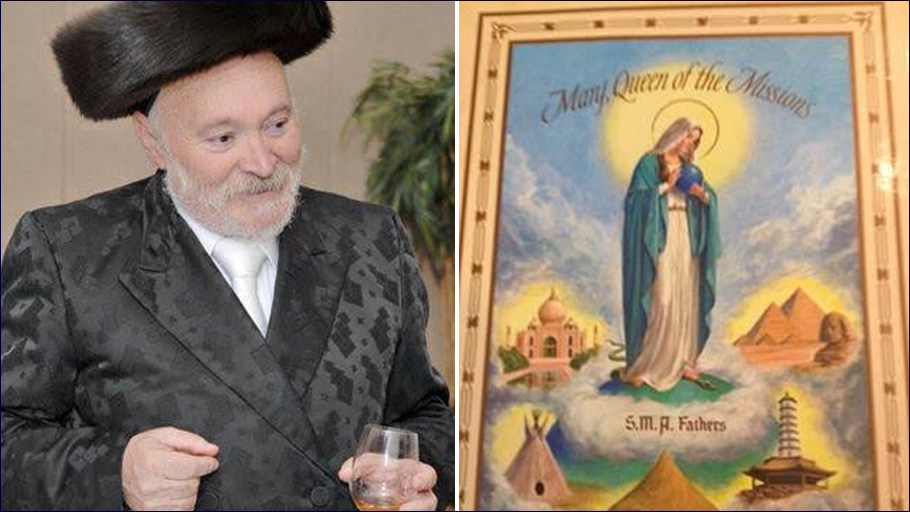

9 min read
Why was a church saying a perpetual mass for my father, a prominent Chasidic rabbi?
Ten days after my father, Rabbi Chaim Grosz, of blessed memory, passed away, I received a large manila envelope with a beautiful card inside from a Catholic church in New Jersey. The front of the card had a woman named “Mary Queen of the Missions”. The inside had a preprinted form in which the church was going to say a Perpetual Mass for the soul of Chaim Grosz, his name carefully handwritten.
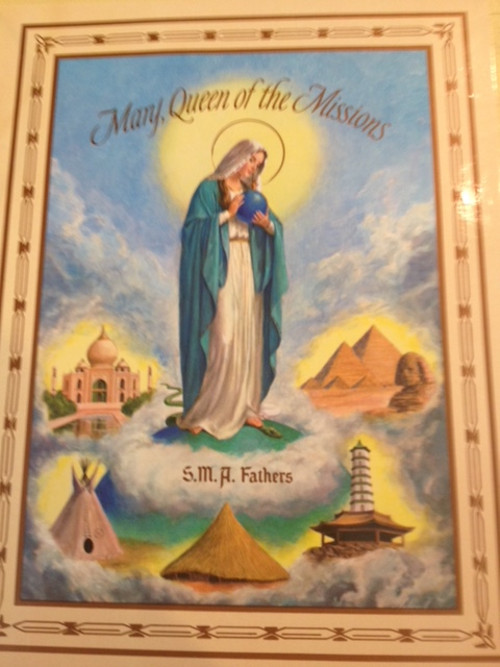 The Mary Queen of the Missions card
The Mary Queen of the Missions card
How could a Perpetual Mass be said for him? My father, a prominent Chasidic rabbi, was born in January 1944 in Hungary. Miraculously, he survived being deported to Bergen Belsen, and when it was liberated 18 months later in April 1945, my father still weighed little more than a newborn. His mother, father, and siblings survived the camps, but they were physically and emotionally broken. Like most of the survivors of the Holocaust, they were unable to return to their homes, and while waiting for legal permission to emigrate, were sent en masse to DP camps (Displaced Persons camps.)
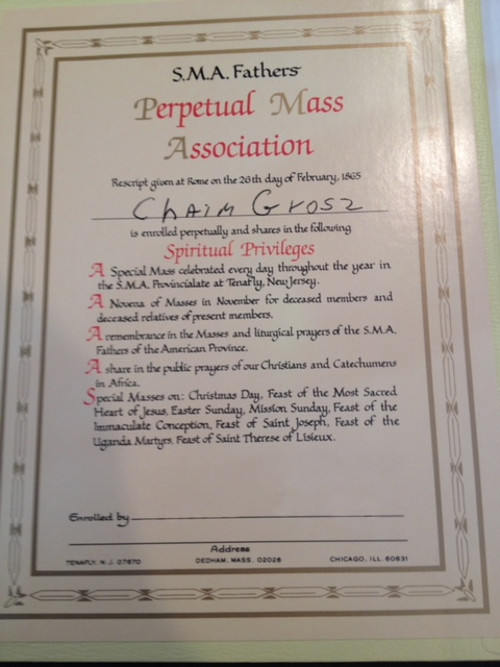 The card with my father’s name
The card with my father’s name
My father and his family sojourned briefly to a DP camp in Italy just before they came to the United States. My father’s father was a well-known Rabbi. Like most Chasidic Hungarian Rabbis, my grandfather wore a long black caftan and a round short hat made of beaver, and as was the custom for a "man of God," he walked with his hands clasped behind his back. And so, confusing my grandfather for a priest, the old Italian women would rush at him and attempt to kiss him in their religious fervor.
My grandfather went to great lengths to avoid this situation, going so far as to change his clothes and to do everything he could to rush his emigration out of Italy. What would he think of this Perpetual Mass card that was sent on behalf of my father, a scion of a Chasidic dynasty?
As the “next of kin” and the executrix of his estate, I was sent the card. But I didn't tell anyone about it; it didn't make sense! I called the church looking for answers. The secretary who answered the phone had a flat Boston accent. She didn’t know anything about it but promised that she would get the "Father himself" to call me. O Father who art in Heaven? What did my father do?
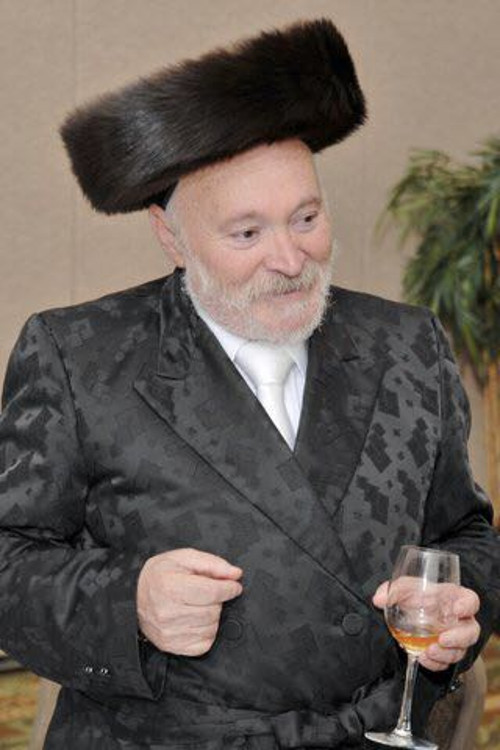 My father, of blessed memory
My father, of blessed memory
Ten days later, I got the call. The priest explained that the church had had some legal problems and when they went to court, they used my father’s case as legal precedence – and they won! My father’s case…
My throat closed up and my eyes got wet thinking about "The Case." In the mid-1970’s, my grandfather had a heart attack and he could no longer walk to synagogue. Jewish law prohibits driving on Shabbos and there was no "eruv," the aerial demarcation line that would have allowed him to be pushed in a wheelchair where he lived. There was simply no way he could get to synagogue on the holy Sabbath and his pitiful cries were heartbreaking.
So my father solved the problem by transforming our family room into an ersatz synagogue, a shteibel which is Yiddish for “room.” One day a week, we lost out on the room that symbolized that we were a nice American family. Other Holocaust survivors, longing for Chasidic style prayers as well as the customary Slivovitz and herring also came. All told, there were maybe 15 old men, some with numbers tattoos on their arms and some without, but all were scarred in some way by the war. They would come on Friday nights and Saturday mornings not so much to pray to God, but to see each other, clinging to each other in their reminiscences about a way of life that no longer existed.
But this was not to last. After three weeks of these weekend gatherings, the neighbors decided to put a stop to it and they called Code Enforcement.
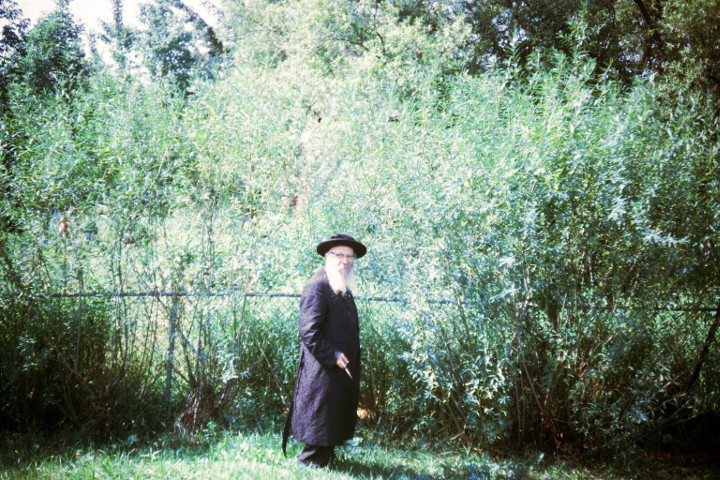 My late grandfather, cutting aravot
My late grandfather, cutting aravot
The city of Miami Beach wanted to close down these Friday night and Saturday day prayer groups. To the city officials, this was purely a zoning issue. We lived in a single family residential area – the law clearly stated that we could not hold prayer services in our home – case closed.
The fearlessness that had fueled his entire existence clicked into gear and he was not going to back down.
My father, who spent his first two years of life with a rag stuffed in his mouth so that no one could hear him cry or make any sort of sound, had only one volume once it was removed: Bellowing. The fiery fearlessness that had fueled his entire existence clicked into gear and he was not going to back down. He was bombastic. Furious. This was America! This was his beloved father! This was just a room in his house where he was hosting once a week prayer gatherings with 15 old men!
No lawyer would take his case. This was against the City of Miami Beach zoning rules and the old saying “You can’t fight City Hall” appeared to be true. Except Chaim Grosz didn’t get the message.
As the son of a rabbi, my father was only allowed to go up to the fourth grade in English or secular studies. At the tender age of 17, his brilliance was recognized and he received his rabbinical ordination from one of the most revered Chasidic Rabbis in the world. Fearless as well, he decided that if no lawyers would take his case, he would do it himself and rely on his prodigious background in Talmudic law.
With the purchase of an IBM Selectric typewriter with the drop-in ball in Times New Roman along with three packages of legal-size paper, I became my father's legal assistant. I learned words like "heretofore," "plaintiff," "defendant," how to type in justified margins, and we relied on a legal dictionary for authority.
My father was going to square off against Janet Reno in the Supreme Court of the State of Florida.
My father lost the first round because of the zoning laws that prohibited a synagogue in a residential area. Filled with fury at what he perceived to be an anti-God and anti-Jewish action, he provoked the judge and got a 60 day suspended sentence.
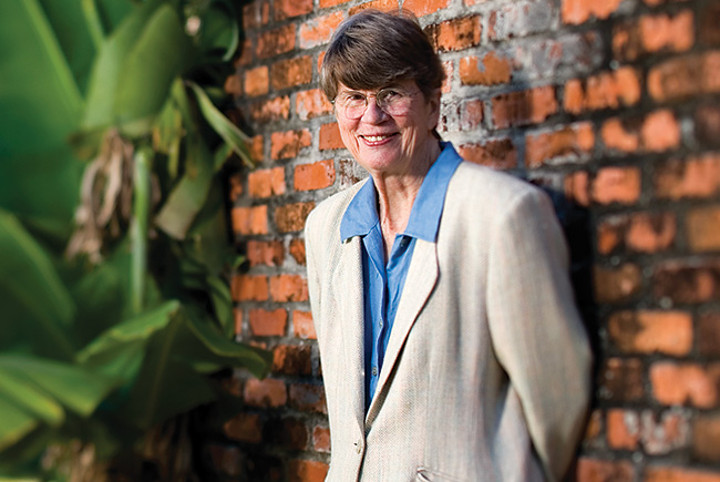 Janet Reno, the State Attorney who became the Attorney General of the United States
Janet Reno, the State Attorney who became the Attorney General of the United States
In 1979, representing himself, armed with conviction, two religious books (a massive Code of Jewish Law and Talmud), his nephew Heshy and my carefully worded and typed briefs, he squared off against Janet Reno in the Supreme Court of the State of Florida. Lawyers do not like "common people" representing themselves. My father came prepared to the high court dressed in suit and tie – clothes he did not normally wear. He was a short round man, no more than 5’3” in black pants that were poorly hemmed. He looked like a child next to the over 6-foot Janet Reno.
The State asserted the claim that my father created a house of worship in an area that was prohibited by the zoning code – a mere ordinance. In return, he decided to fight them with Constitutional law. He laid out his strategy stating that the First Amendment had both freedom of religion and the right to assemble peacefully. He then quoted the 14th Amendment which ratified the States to allow peaceful assembly. The State called up their expert witness who would explain to the court what a synagogue looks like.
When it was my father’s turn to cross-examine, he hoisted up the two large Hebrew books onto the witness stand. He asked the expert to read in Hebrew the requirements for a synagogue, but the expert could not read Hebrew!
My father then turned to the judge and said, “Your Excellency, there is no way that this could be an expert on Jewish synagogues. He cannot read Hebrew, the original language of the Jewish people.”
He continued, “Even the Founding Fathers spoke Hebrew! They even spoke Hebrew at Harvard! How could a Jewish expert on Jewish law not know the language in the original?”
Perhaps the judge was charmed by the “Your Excellency,” but despite vigorous objections from the State Attorney, he removed the expert. My father explained how a synagogue operates versus a prayer group meeting: There were no dues; he made no money; it occurred only on the weekend. Furthermore, no one drove, as it was the holy Sabbath, and so no cars were clogging up the swales. Finally, there were never more than 15 men. It was a religious meeting, pure and simple, protected under both the first and fourteenth amendments.
He won the appeal and was featured on all the major news channels.
He not only won the appeal, he was featured in the Miami Herald, and on the three news channels (ABC, NBC, and CBS) that existed then. It was a tremendous victory. He went up against City Hall, the State of Florida, the State Attorney who became the Attorney General of the United States and the Supreme Court of Florida.
His case set a precedent. And this Catholic church in New Jersey, a Korean temple in Hawaii, a Santeria church in Hialeah, and hundreds of others used his case as precedence to fight their own religious and zoning battles.
I still have the Perpetual Mass card along with his papers and his wallet in my safety deposit box. It’s a testament to a man who once born, wasn’t allowed to speak, who built a small synagogue to please his father, and ended bringing God everywhere.

Amazing story! Thank you for sharing 🙂